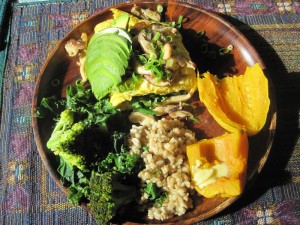We’ve all been told to stay away from saturated fats, and to embrace unsaturated fats like vegetable oils. But there are now more and more scientific studies that point to cholesterol NOT being the cause of heart disease…not nearly as much as trans fats in the diet and/or a high glycemic diet.
There ARE healthy vegetable oils like good quality virgin (unrefined) olive & sesame oils, and these oils should not be used with high heat in cooking. You see, even these healthy, unrefined vegetable oils develop trans fats with heat or pressure, which is why the processed food industry can claim “zero grams trans fats” when using these oils. But after these oils are made into cookies, crackers, and chips, trans fats ARE formed!
Processed/refined vegetable oils such as canola, corn soybean, “vegetable” oils not only develop trans fats with the heat or pressure of processing, but they oxidize and decrease your body’s stores of valuable omega-3 fats, increasing inflammation. When used for cooking they form long-chain trans fatty acids, which act like a sticky matrix in the arteries, which good saturated fats adhere to. This is why consuming refined vegetable oils raise your risk for cardiovascular disease, especially when combined with saturated fats.
Personally, I stay away from most cookies, crackers, and chips, because they’re usually made with canola, corn, soybean, palm, or vegetable oils. And I especially avoid them if they’re made with hydrogenated oils (like shortening and margarine), as these are the highest in trans fats. I also steer clear of foods cooked with vegetable oils at restaurants, especially the fried foods.
1 in 4 Americans over the age of 45 are on statin drugs to lower their cholesterol, but as you can see now, cholesterol is not the issue. These drugs have been shown to only end up lowering cholesterol a small amount, and most importantly, they impair the body’s ability to make Co enzyme Q10, a fat soluble antioxidant which protects our cells from oxidation. They also impair your body’s production of both vitamin K2 and ketone bodies. If you want to stay on a statin drug, you’ll want to consider supplementing CoQ10, or the more absorbable form of it called Ubiquinol, as well as vitamin K2.
Statin drugs benefit just 1 percent of the population. This means that out of 100 people treated with the drugs, one person will have one less heart attack. This doesn’t sound so impressive, so statin supporters use a different statistic called “relative risk”, so with this statistical sleight of hand, statins suddenly become beneficial for 30 to 50 percent of the population.
While saturated fats do increase cholesterol, cholesterol is a very important component of our bodies because a major building block of our brain and nervous system is cholesterol, and cholesterol also feeds our glands which secrete important hormones. Most importantly, if your body doesn’t get any dietary cholesterol, your liver will begin to over-produce it.
So, it’s important to know which fats actually contribute to heart disease, and which ones don’t, which fats to use for cooking, and which fats to steer clear of in packaged foods, so I listed them for you at the bottom of this post.
Sources:
1) Dr. Weston A. Price: Dangers of Statin Drugs: What You Haven’t Been Told About Popular Cholesterol-Lowering Medicines https://www.westonaprice.org/health-topics/modern-diseases/dangers-of-statin-drugs-what-you-havent-been-told-about-popular-cholesterol-lowering-medicines/
2) Dr. John Douillard: The Scary Facts About Vegetable Oils
https://lifespa.com/scary-facts-polyunsaturated-vegetable-oils/
3) Dr. Joseph Mercola: 5 Great Reasons Why You Should Not Take Statins
https://articles.mercola.com/sites/articles/archive/2016/02/10/5-reasons-why-you-should-not-take-statins.aspx
Story at-a-glance: There is evidence showing that statins may actually make your heart health worse and only appear effective due to statistical deception / Statins deplete your body of CoQ10, inhibit synthesis of vitamin K2, and reduce the production of ketone bodies / Statins increase your risk of serious diseases including cancer, diabetes, neurodegenerative diseases, musculoskeletal disorders and cataracts
Tips On How to Protect Your Heart Health, by Dr. Mercola
Reduce excess weight by eliminating excess sugars in your diet. It is vitally important to eliminate gluten-containing grains and sugars, especially fructose.
Consume a good portion of your food raw.
Make sure you are getting plenty of high-quality, animal-based omega-3 fats, such as krill oil. Research suggests that as little as 500 mg of krill per day may improve your total cholesterol and triglycerides and will likely increase your HDL cholesterol.
Replace harmful vegetable oils and synthetic trans fats with healthy fats, such as olive oil, butter and coconut oil (remember olive oil should be used cold only; use coconut oil for cooking and baking).
Include fermented foods in your daily diet. These will not only optimize your intestinal microflora, which will boost your overall immunity, but will also introduce beneficial bacteria into your mouth.
Poor oral health is another powerful indicator of increased heart disease risk.
Optimize your vitamin D levels, ideally through appropriate sun exposure as this will allow your body to also create vitamin D sulfate — another factor that may play a crucial role in preventing the formation of arterial plaque.
Exercise regularly. Make sure you incorporate high-intensity interval exercises, which also optimize your human growth hormone (HGH) production.
Stop smoking and drinking alcohol excessively.
Be sure to get plenty of high-quality, restorative sleep and practice stress-management techniques.
GOOD SATURATED FATS for cooking
Coconut, Palm, Butter, Ghee, Lard, Tallow, Chicken Fat, Lamb Fat, Duck Fat, Full Fat Dairy (preferably raw dairy products), Eggs, Meat, Seafood
GOOD UNSATURATED FATS for cold uses (salad dressing, etc)
Olive Oil, Sesame Oil, Nut Oils, Flaxseed Oil, Avocado, Nuts & Seeds
BAD SATURATED FATS
Hydrogenated Oils, Shortening, Margarine, “buttery spreads”
BAD UNSATURATED FATS
Canola Oil (Rapeseed), Corn Oil, Vegetable Oil, Soybean Oil, Grapeseed Oil, Sunflower Oil, Safflower Oil, Rice Bran Oil
NOTE: “high oleic sunflower oil” and “high oleic safflower oil” are less damaging
Sources:
www.westonaprice.org
www.mercola.com
www.lifespa.com
